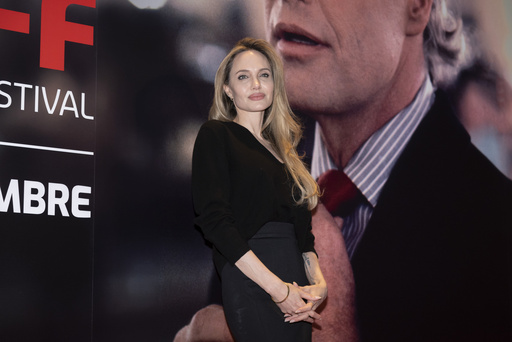
NEW YORK — Angelina Jolie did not anticipate fully capturing the essence of Maria Callas in her latest role, but the process has surprisingly uncovered emotions within her that she had not previously recognized.
In a recent chat, Jolie reflected, “Throughout our lives, we hold onto different experiences in various parts of our bodies for protection. We might carry tension in our stomachs or breathe differently when we’re facing sadness or anxiety.”
Jolie described her early rehearsals for the film as particularly challenging, stating, “The initial weeks were difficult as my body had to adapt and relearn how to breathe. It was a revelation to realize how constrained I had been.”
In Pablo Larraín’s film “Maria,” which debuted in theaters before its Netflix streaming on December 11, Jolie delivers what may be regarded as her most compelling performance in the last decade. After taking a break from acting to focus on directing and raising her six children, she returns to the spotlight with renewed vigor.
“I had to make choices that were financially sensible and short-term, and for several years, I hardly worked,” Jolie revealed. “It left me feeling exhausted, and I was at a standstill for a time.”
Now, with her youngest children reaching 16 years of age, Jolie has embraced new opportunities, and her role in “Maria” is positioned to potentially earn her a third Oscar nomination, following her win in 2000 for “Girl, Interrupted.” This performance could very well define her legacy, bounded by a filmography that lacks a singular standout project.
Interestingly, Jolie’s oldest sons, Maddox and Pax, contributed to the film’s production, witnessing a different side of their mother. “They’ve seen me in moments of sadness, but experiencing my emotional release during this role was unprecedented,” she said. “It was a moment of revelation for us in understanding the depths of my personal struggles.”
In a meeting with a reporter at the Carlyle Hotel, Jolie refrained from elaborating on those struggles but hinted that they could be linked to her protracted divorce from Brad Pitt, with whom she shares six children. Recent legal developments, including a judge’s ruling allowing Pitt’s claims over a French winery to move forward, indicate ongoing tension, with Pitt having to provide documents related to alleged abuse—a claim he has denied.
With the aftermath of the recent U.S. presidential election still fresh, Jolie, who served as a special envoy for the United Nations Refugee Agency until 2022, was hesitant to discuss political matters. When asked about the election, she said, “Global storytelling holds great importance. I’m focused on listening to the voices of people, both here and around the world.”
Jolie’s ability to juggle her high-profile status amidst personal challenges aligns well with her portrayal of Callas, a celebrated soprano navigating her final days. Set against the backdrop of a once-glorious career now marred by lost voice and public scrutiny, the film portrays Callas as she endeavors to redefine herself and reclaim her voice—a sentiment reflected in her instructor’s desire to hear “Callas, not Maria.”
This film marks Larraín’s third exploration of iconic women of the 20th century, following “Jackie” and “Spencer.” In portraying Callas, Jolie embodies a regal presence—a commanding diva who expresses poignant lines, like, “I took liberties all my life, and the world took liberties with me.”
When asked whether she resonated with that statement, Jolie replied, “Absolutely,” pausing momentarily as she contemplated the ramifications of her public persona.
“I know Callas was publicly visible because of her passion for her art, and I find myself in a similar situation. I’m recognized publicly not out of comfort for the attention but because of my own love for my work.”
Larraín approached Jolie after seeing her potential in the role, believing she could portray the magnetic presence of Callas, who is burdened by her past while striving to regain control over her life.
“There is an isolation that we both experience,” Jolie expressed, contemplating the nuances of loneliness. “Being alone and feeling isolated can sometimes be a part of who you are, and it’s not necessarily negative.”
The Chilean director has long desired to capture the universe of opera on film, and in Callas, he found an element that captivated him. “There’s a quality of near-perfection in her, yet it’s also fragile. It showcases the extremes—strength and breakability, which is profoundly moving.”
Larraín also integrates archival sounds of Callas with Jolie’s singing in the film, leading Jolie to realize that opera cannot be faked. “I’ve never sung before, not even in karaoke, but this experience has opened me up to the healing aspects of opera,” she shared.
“Perhaps as we age, we become more attuned to our pain and loss, and opera resonates with that depth,” she mused.
The director observed that in a world saturated with information through media, the public often mistakenly believes they know celebrities like Jolie. “I researched Callas extensively, yet we’re left with a sense of mystery about her—much like Angelina herself.”
As for whether this newest role will lead to more acting gigs for Jolie, she remains uncertain, stating, “There’s no clear path ahead.” She is still processing her emotional connection to Callas.
“When you portray someone real, they almost feel like a friend in a way. At the moment, it feels very personal, and it’s a bit surreal—especially when I hear her music unexpectedly, which can trigger deep emotional memories for me.”
